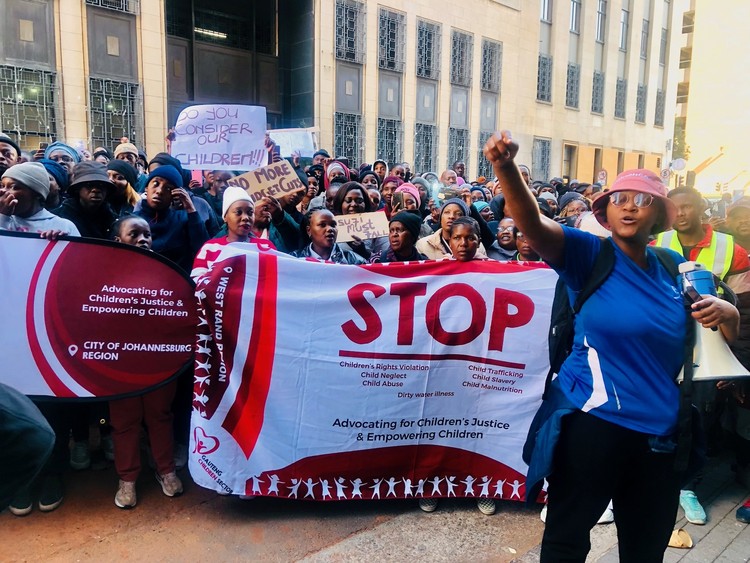
27 June 2025
Over 300 workers marched, demanding reinstatement of psychosocial funding, the return of food parcel distribution, and an end to harassment by government officials. Photo: Kimberly Mutandiro
Over 300 workers and beneficiaries from non-profit organisations in Gauteng’s Children’s Sector marched from Mary Fitzgerald Square to the office of Gauteng Premier Panyaza Lesufi in Johannesburg on Thursday.
The protesters demanded an end to recent budget cuts that reduced monthly psychosocial support funding from R1,000 to R500 and saw food parcel distribution responsibilities removed from organisations. They are also calling for an end to what they describe as intimidation of their staff by Department of Social Development officials deployed to their offices.
The organisations argue that the Premier has the power to overturn the budget cut decisions implemented by the social development department
March convener Zodwa Latola, from the Breakthrough Center, said the budget cuts affected 288 organisations, including 36 drop-in centres. She said many have been without funding for three months.
“We work in communities where there is a high level of trauma, GBV, mental health issues, and substance abuse. The previous allocation of R1,000 was already small, and the department has cut it to R500, making it difficult for services to be rendered,” said Latola.
She said the withdrawal of food parcel responsibilities has also worsened the situation.
“These decisions … are not only regressive but are causing immeasurable harm to the poorest and the most vulnerable in our communities,” read the memorandum handed to the premier’s office.
The organisations say the cuts devalue the work of community caregivers and send a message that mental health and psychosocial support are not priorities, despite them witnessing a growing burden of trauma and vulnerability in communities.
Winnie Mkhize, a social auxiliary worker in Sebokeng, said her centre could no longer provide school uniforms or holiday programmes. “Children are suffering. It’s winter now, and some go to school without jerseys,” she said.
Lebohang Setai, from Group of Mercy in Sedibeng, said, “R500 cannot even buy school shoes for one child.”
Nteboheng Motau said the psychosocial funding was also previously used to help families with hospital transport and assist elderly people looking after orphaned children.
Don Ndou said Tshwane organisations are experiencing victimisation by social development officials, making their work nearly impossible.
The premier’s office received and signed the group’s memorandum.
The Department of Social Development spokesperson Motsamai Mothaolwa said the department’s budget was cut, making it review its spending.
“There is already a food bank system, so one system will be used now to distribute food parcels across the department … The other benefit … is that beneficiaries can access services beyond just food, which include skills development and training programmes.”
“We are not aware of intimidation by our staffers. Behaviour that is deemed intimidating must be reported,” said Mothaolwa.